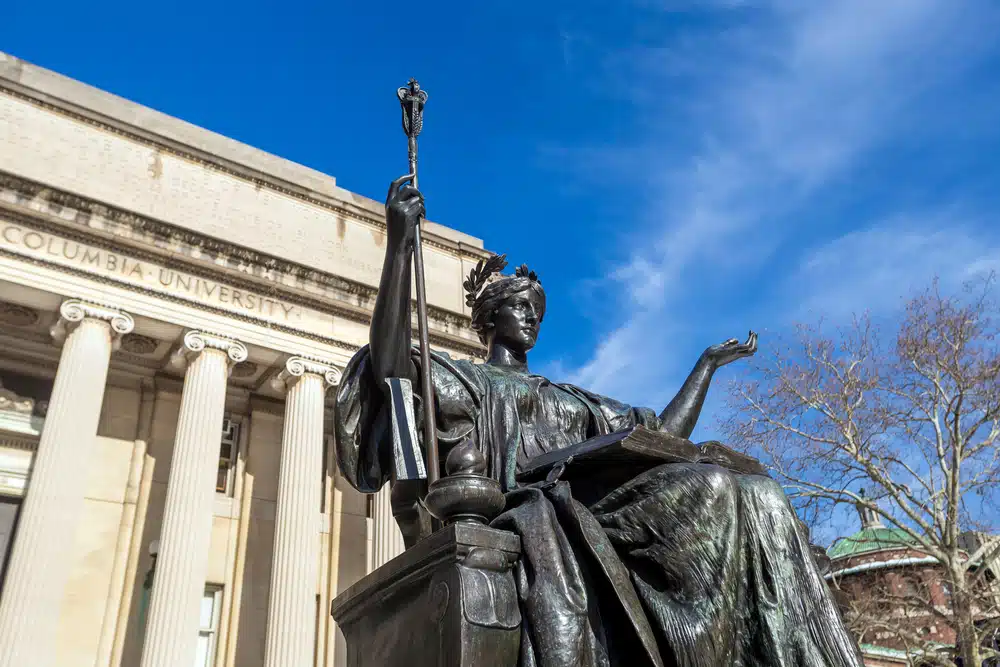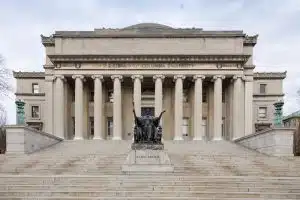Exploring the Landscape of Columbia Political Science
As one of the most prestigious universities in the world, Columbia University offers a varied and comprehensive political science program for students seeking to understand the world of politics and social sciences. In this article, we will explore the landscape of the Columbia political science program, including its history, research opportunities, student life, and career prospects.
A Brief History of Political Science at Columbia University
Columbia’s Department of Political Science was established in 1880, making it one of the oldest and most distinguished political science programs in the United States. It has produced many notable alumni, including several US presidents, Supreme Court justices, and Pulitzer Prize-winning journalists. Today, the department is known for its focus on comparative politics, international relations, and political theory, among other fields.
In addition to its renowned faculty and alumni, Columbia’s Department of Political Science is also known for its innovative research initiatives. The department has been at the forefront of developing new methodologies for studying political phenomena, including the use of big data and computational analysis.
This has led to groundbreaking research on topics such as political polarization, social movements, and the role of technology in politics. The department’s commitment to cutting-edge research ensures that it remains a leader in the field of political science.
The Top Political Science Programs Offered at Columbia University
Columbia offers three main programs in political science: the BA, MA, and PhD. The BA program provides students with a strong foundation in political theory and empirical analysis. The MA program offers a more specialized focus on a particular area of political science, such as international relations or comparative politics. The PhD program allows students to pursue advanced research and scholarship in political science.
Additionally, Columbia University offers a variety of opportunities for students to engage in political science research outside of the classroom. The university’s Institute for Social and Economic Research and Policy (ISERP) provides funding and resources for faculty and students to conduct research on a wide range of social and political issues.
Students can also participate in research projects through the university’s various research centers, such as the Center for the Study of Democracy, Toleration, and Religion or the Center for International Conflict Resolution.
Distinguished Faculty in the Political Science Department at Columbia University
Columbia’s political science faculty is composed of some of the most distinguished and renowned political scientists in the world. Many of them have received numerous awards and have been published widely in academic journals and books. They bring a wealth of knowledge, expertise, and experience to the classroom, and are committed to providing their students with a rigorous and intellectually stimulating education.
One of the notable faculty members in the Political Science Department at Columbia University is Professor Robert Y. Shapiro. He is a leading expert in American politics and public opinion and has authored several books on the subject. Professor Shapiro has also served as a consultant to various government agencies and political campaigns and is a frequent commentator on national news programs.
Another distinguished faculty member is Professor Karen Barkey, who specializes in comparative politics and historical sociology. She has conducted extensive research on the Ottoman Empire and its legacy and has published several books and articles on the subject. Professor Barkey is also a recipient of numerous awards and fellowships and has served as the President of the Association for the Study of Nationalities.
A Look Inside the Curriculum of Columbia University’s Political Science Program
The curriculum of Columbia’s political science program is designed to provide students with a strong foundation in political theory, empirical analysis, and research methods. Students are required to take courses in political philosophy, American politics, comparative politics, international relations, and research methods. Additionally, they have the opportunity to take many elective courses in a range of subfields.
One of the unique aspects of the political science program is its emphasis on interdisciplinary studies. Students are encouraged to take courses in related fields such as economics, history, and sociology to gain a broader understanding of political issues. This interdisciplinary approach allows students to develop a more nuanced understanding of political phenomena and to approach problems from multiple perspectives.
Another notable feature of the program is its focus on experiential learning. Students have the opportunity to participate in internships, research projects, and study abroad programs to gain practical experience and apply their knowledge in real-world settings. These experiences not only enhance students’ resumes but also provide valuable insights into the workings of politics and policy-making.
Student Life in Columbia University’s Political Science Department
Columbia’s political science department offers a vibrant and intellectually stimulating community for students. The department sponsors many events, including guest lectures, seminars, and conferences. There are also several student-run organizations, such as the Political Science Students’ Association and the Model United Nations Club, which offer opportunities for students to engage with their peers and develop their academic and professional skills.
Additionally, the department has a strong focus on research and encourages students to get involved in faculty-led projects. This provides students with valuable hands-on experience and the opportunity to contribute to cutting-edge research in the field.
The department also offers various study abroad programs, allowing students to gain a global perspective on political science and expand their cultural horizons. Overall, the political science department at Columbia University provides students with a well-rounded and enriching academic experience.
How to Succeed in a Political Science Major at Columbia University
A successful political science major at Columbia will need to have strong analytical and writing skills, as well as a deep and broad understanding of political theory and empirical analysis. It is essential for students to take advantage of the many research opportunities, internships, and other extracurricular activities offered by the department and university. Additionally, cultivating relationships with faculty mentors and pursuing advanced degrees are important steps toward a successful career in political science.
One way to develop strong analytical skills is to take courses in statistics and data analysis. These skills are increasingly important in the field of political science, as more and more research is conducted using quantitative methods. Students should also consider taking courses in related fields, such as economics or sociology, to gain a broader understanding of the social sciences.
Another important aspect of succeeding in a political science major at Columbia is staying up-to-date with current events and political developments. This can be done by reading newspapers and political journals, attending lectures and events on campus, and participating in political organizations or campaigns. By staying informed and engaged, students can develop a deeper understanding of the political landscape and apply their knowledge to their coursework and research.
Career Opportunities for Graduates of Columbia’s Political Science Program
Graduates of Columbia’s political science program have gone on to successful careers in a range of fields, including academia, law, public service, journalism, and business. The BA program provides a solid foundation for entering the job market, while the MA and PhD programs prepare students for advanced research and scholarship. Additionally, the department offers many resources for career development, including internships, fellowships, and job placement services.
One notable aspect of Columbia’s political science program is its emphasis on practical experience. Students have the opportunity to participate in internships with government agencies, non-profit organizations, and political campaigns. These experiences not only provide valuable skills and connections but also help students clarify their career goals and interests. Many graduates credit their internships with helping them secure their first job after graduation, and some have even gone on to work for the same organization where they interned.
Graduates Spotlight: Success Stories from Alumni of Columbia’s Political Science Program
Graduates of Columbia’s political science program have achieved great success in a range of fields. For example, Ruth Bader Ginsburg, a 1959 graduate of the program, went on to become a US Supreme Court Justice and trailblazer for women’s rights. Another notable alum is Fareed Zakaria, a 1986 graduate, who is a journalist and political commentator for CNN and the Washington Post. Their success demonstrates the breadth and depth of opportunities available to graduates of Columbia’s political science program.
Additionally, many graduates of Columbia’s political science program have gone on to successful careers in government and public service. For instance, Eric Garcetti, a 1992 graduate, is the current mayor of Los Angeles, while Samantha Power, a 1999 graduate, served as the US Ambassador to the United Nations under President Obama. These alumni have made significant contributions to society and have helped shape the political landscape of the United States and beyond.
How to Apply to Columbia University’s Political Science Program
Interested students can apply to Columbia’s political science program through the undergraduate, graduate, or doctoral admissions process. Undergraduate applicants will need to submit a common application and supplemental materials, including transcripts, essays, and letters of recommendation. Graduate and doctoral applicants will need to submit similar materials, along with GRE scores and a statement of purpose.
It is important to note that Columbia University’s political science program is highly competitive, with a low acceptance rate. Therefore, it is recommended that applicants have a strong academic record, relevant extracurricular activities, and compelling personal statements. Additionally, prospective students may benefit from reaching out to current students or alumni of the program to gain insight into the application process and program experience.
Diversity and Inclusion in the Political Science Department at Columbia University
Columbia’s political science department is committed to promoting diversity and inclusion in all aspects of its work. The department values diversity of backgrounds, perspectives, and experiences among its faculty and students, and actively works to create a welcoming and inclusive environment for all. This commitment to diversity and inclusion is reflected in the department’s curriculum, research, and extracurricular activities.
One of the ways in which the department promotes diversity and inclusion is through its recruitment and retention efforts. The department actively seeks out and recruits faculty and students from underrepresented groups, and provides support and resources to ensure their success. Additionally, the department offers a variety of programs and initiatives aimed at promoting diversity and inclusion, such as workshops, seminars, and mentorship opportunities.
Student Organizations and Extracurricular Activities for Poli-Sci Majors at Columbia
There are many student organizations and extracurricular activities available for political science majors at Columbia, including the Political Science Student’s Association, the Model United Nations Club, and the Columbia Political Review. These organizations provide students with opportunities to engage with their peers, develop their academic and professional skills, and participate in the broader political and social debates of our time.
Another popular student organization for political science majors at Columbia is the Roosevelt Institute, which is a student-run think tank that focuses on policy research and advocacy. The institute provides students with opportunities to conduct research, write policy papers, and engage with policymakers and experts in various fields.
Additionally, Columbia University offers a wide range of extracurricular activities that are not specifically geared toward political science majors but are still relevant and beneficial for students interested in politics and social issues. These include student-run newspapers, such as the Columbia Daily Spectator and the Columbia Journal of Politics and Society, as well as community service organizations, such as the Columbia Community Outreach Program and the Columbia Urban Experience.
Research Opportunities in Political Science at Columbia University
Columbia offers numerous research opportunities for students in political science, including fellowships, internships, and research assistantships. Students can also participate in the Political Science Senior Thesis Seminar, which provides support and guidance for students undertaking independent research projects. Additionally, the department sponsors many research centers and institutes, such as the Institute for Social and Economic Research and Policy and the Center for International Conflict Resolution.
One of the unique research opportunities available to political science students at Columbia is the chance to work with the Columbia Global Policy Initiative. This program brings together scholars, policymakers, and practitioners to address global challenges and develop innovative policy solutions. Students can participate in research projects and events, gaining valuable experience and networking opportunities.
Another exciting research opportunity is the chance to work with faculty members on their own research projects. Many professors in the political science department are engaged in cutting-edge research on topics such as international relations, comparative politics, and political theory. By working with these scholars, students can gain insight into the research process and contribute to important academic debates.
The Role of Politics in Campus Life at Columbia University
Politics plays a significant role in campus life at Columbia, with many students and faculty actively engaged in political activism, advocacy, and research. The university also hosts many political events, including lectures, debates, and demonstrations. It is common for students to take part in political discussions and activities, both on and off campus, as they explore their interests and build their skills.
One notable aspect of politics at Columbia is the presence of student-run political organizations. These groups cover a wide range of political ideologies and issues, from environmentalism to human rights to economic policy. They provide opportunities for students to get involved in political campaigns, organize events, and network with like-minded individuals. Additionally, many of these organizations collaborate with faculty members to conduct research and advocacy on important political topics.
Current Events and Debates in the World of Political Science, as Taught at Columbia
The world of political science is dynamic and ever-changing, with new events and debates emerging all the time. At Columbia, students have the opportunity to explore the latest topics and controversies in political science, including issues related to globalization, climate change, social justice, and democracy. Instructors use a variety of teaching methods, including lectures, seminars, and workshops, to engage students in critical thinking and analysis.
In conclusion, exploring the political science landscape at Columbia University reveals a rich and diverse range of academic programs and opportunities for students interested in the political world. The department’s distinguished faculty, comprehensive curriculum, vibrant student life, and commitment to diversity and inclusion make Columbia a premier destination for those seeking to pursue a career or academic research in political science.
One of the current events that has been a topic of discussion in the political science department at Columbia is the ongoing refugee crisis. Students have the opportunity to learn about the political, economic, and social implications of the crisis, as well as the policies and actions taken by different countries and international organizations to address it. This topic is particularly relevant in today’s globalized world, where the movement of people across borders has become increasingly complex and contentious.
Another area of debate in political science that is explored at Columbia is the role of technology in politics. With the rise of social media and other digital platforms, political communication and campaigning have undergone significant changes in recent years. Students can learn about the opportunities and challenges that technology presents for democracy, as well as the ethical and legal issues that arise from the use of data and algorithms in political decision-making.
Want to learn more about getting into Columbia? You’ve come to the right place. At AdmissionSight, we have over 10 years of experience guiding students through the competitive admissions process.
AdmissionSight can help you put your best foot forward when applying to college this fall. Contact us today for more information on our services.









































